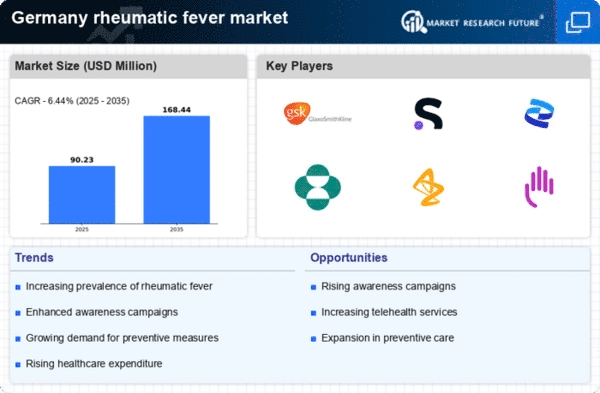Government Initiatives and Funding
Government initiatives aimed at combating rheumatic fever are significantly influencing the rheumatic fever market in Germany. The German government has recognized the need for comprehensive strategies to address this public health issue. Increased funding for research, awareness campaigns, and preventive measures is being allocated to tackle the rising incidence of rheumatic fever. For instance, the government has launched programs to educate healthcare providers and the public about the importance of early diagnosis and treatment. This proactive approach is expected to enhance the overall management of rheumatic fever, leading to a more robust market. Furthermore, collaboration between government agencies and healthcare organizations may foster innovation in treatment options, thereby improving patient outcomes and driving market growth.
Rising Incidence of Rheumatic Fever
The increasing incidence of rheumatic fever in Germany is a critical driver for the rheumatic fever market. Recent data indicates that the prevalence of rheumatic fever has shown a concerning rise, particularly among children aged 5 to 15 years. This trend necessitates enhanced healthcare interventions and treatment options, thereby expanding the market. The German healthcare system is responding to this challenge by allocating more resources towards the prevention and management of rheumatic fever. As a result, healthcare providers are likely to invest in innovative therapies and educational programs aimed at reducing the incidence of this disease. The growing number of cases may also lead to increased funding for research and development in the rheumatic fever market, ultimately benefiting patients and healthcare professionals alike.
Growing Focus on Pediatric Healthcare
The growing focus on pediatric healthcare is emerging as a significant driver for the rheumatic fever market. In Germany, there is an increasing recognition of the unique healthcare needs of children, particularly in relation to infectious diseases like rheumatic fever. Pediatricians and healthcare providers are prioritizing the prevention and management of rheumatic fever through targeted interventions. This focus is likely to result in the development of specialized treatment protocols and educational resources tailored for children. Additionally, the rising awareness among parents regarding the importance of early detection and treatment of rheumatic fever is expected to contribute to market growth. As healthcare systems adapt to these needs, the rheumatic fever market may witness an uptick in demand for pediatric-specific therapies and preventive measures.
Technological Advancements in Diagnostics
Technological advancements in diagnostics are playing a pivotal role in shaping the rheumatic fever market. Innovations in diagnostic tools and techniques are enabling healthcare professionals in Germany to identify rheumatic fever more accurately and at earlier stages. Enhanced diagnostic capabilities can lead to timely interventions, which are crucial for preventing severe complications associated with the disease. The integration of advanced technologies, such as rapid antigen detection tests and molecular diagnostics, is likely to improve the efficiency of healthcare delivery. As a result, the rheumatic fever market may experience growth driven by the demand for these advanced diagnostic solutions. Moreover, the increased accuracy in diagnosis can lead to better treatment outcomes, further solidifying the market's potential.
Increased Collaboration Among Healthcare Stakeholders
Increased collaboration among healthcare stakeholders is a notable driver for the rheumatic fever market. In Germany, various entities, including government agencies, healthcare providers, and non-profit organizations, are joining forces to address the challenges posed by rheumatic fever. This collaborative approach is fostering the sharing of knowledge, resources, and best practices, which can enhance the overall management of the disease. By working together, stakeholders can develop comprehensive strategies that encompass prevention, early diagnosis, and effective treatment. Such initiatives are likely to lead to improved patient outcomes and a more efficient healthcare system. Furthermore, this collaboration may stimulate innovation within the rheumatic fever market, as stakeholders explore new therapies and interventions to combat the disease.
















